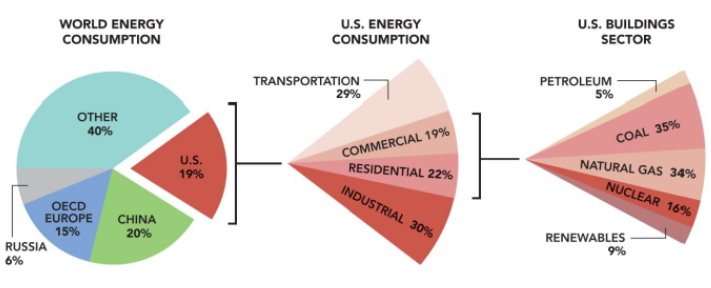The Sustainability Edge in Real Estate Investing
The Sustainability Edge in Real Estate Investing
by Kimberly Ryan, Senior Portfolio Manager, Wells Fargo Private Bank
Commercial real estate can have a significant impact on the environment and an increasing number of real estate industry professionals are incorporating sustainability practices into corporate strategy and building management. Kimberly Ryan, Portfolio Manager for Wells Fargo Private Bank’s Social Impact Investing (SII) REIT strategies offers her thoughts on the benefits of integrating sustainability and ESG analysis into the REIT investment process.
Why is sustainability important for real estate management teams to address?
U.S. buildings account for 41% of primary energy consumption and 74% of all electricity consumed domestically. They account for more annual energy use than the U.S. transportation sector and produce more greenhouse gases than any other country in the world except China. Greenhouse gas emissions from U.S. buildings are expected to grow faster than any other sector through 2030
Further, regulators are getting involved. In California, regulators have set a goal of having all buildings reach zero net energy – that is, consuming only as much energy as can be generated on-site by renewable sources – by 2030.
We believe this presents a huge economic opportunity for real estate management teams to retrofit, upgrade and redesign to better position their assets for a lower-carbon economy.
Are there financial benefits that accrue to companies and management teams that prioritize sustainability?
Improvements in building efficiency can provide real cost savings to landlords and tenants. Some of the more impactful initiatives include the installation of more efficient LED lighting; upgrades to heating, ventilation and air conditioning (HVAC); smart metering; reductions in water consumption; and waste management.
Above and beyond any cost savings, however, sustainably-managed structures typically command higher rents, and experience lower vacancy and higher tenant satisfaction.[4] This positively impacts property valuations and may also play a role in portfolio strategy as management teams evaluate whether to dispose, renovate or acquire properties as a way to generate higher returns on investment.
As an investor, how do you evaluate the sustainability performance of a real estate operating company?
We take a broad view of sustainability, focusing not just on the environment, but also on broader social and governance issues. We evaluate performance by reviewing a company’s environmental disclosures and talking with management about its specific goals for energy, water and waste management. We examine current progress toward these goals as well as future opportunities. Building certifications and the use of ‘green leases’ can serve as an additional avenue into management’s thinking on sustainability.
We pay attention to tenant health and well-being. This is an emerging area of interest, and industry leaders are innovating to create healthier environments for tenants. Initiatives may include improved air quality, green cleaning, exposure to natural light and access to healthy food, to name a few.
Read Kimberly's complete article, that include insight on the WF Social Impact Investing team and their REIT Strategies, all here - https://greenmoney.com/the-sustainability-edge-in-real-estate-investing
======




